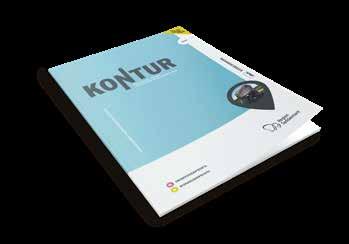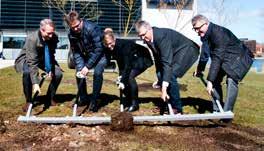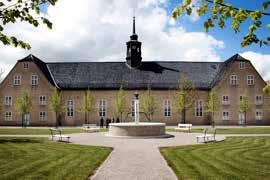
3 minute read
Strong partnerships
Southern Denmark of the Future – a shared initiative
Globalisation, climate change, urbanisation, demographic shifts, digitalisation and other rapid technological developments are global megatrends that also affect citizens and companies in Southern Denmark.
Advertisement

Working together in partnerships, shared knowledge bases and joint project development involving citizens, public authorities, education and research institutions, cultural institutions, enterprises, labour market parties, the civil society, international partners and many others constitute crucial preconditions for the ability to set shared regional agendas, access international inspiration, tackle shared challenges, and utilise special areas of potential in an attractive and sustainable region.

This applies when establishing future-proof courses of education, when promoting the world heritage of Southern Denmark, when major cultural events are to be staged, when climate change is to be prevented – or the consequences of same dealt with – when we are to make sure future generations have access to clean drinking water, and when we work to create the best possible framework for a healthy, active life.
Strong regional partnerships
Strong partnerships across boundaries between public sector players and private enterprises can help ensure sustainable education options in all parts of the region. In Sønderborg, where companies have been short of engineers for many years, a broad regional partnership has taken the initiative to finance the Centre for Industrial Electronics (CIE) at the University of Southern Denmark. The centre teaches BSc and MSc courses designed specifically to provide the skills that the nearby industrial enterprises are demanding. The partners behind this extraordinary public-private partnership are the University of Southern Denmark, the Region of Southern Denmark, Danfoss, LINAK, and the Municipality of Sønderborg.
Financing
Shared initiatives demand shared financing and resources. One example of this is the area of culture, where cultural projects and events help raise our profile, make Southern Denmark more attractive, reinforce innovative cultural environments and support the strengths and distinguishing features inextricably tied to the region. For this reason, the Regional Council has teamed up with a number of other parties to finance key events and remarkable institutions, including initiatives centred on UNESCO’s recognition of the Wadden Sea, bringing the Tour de France to Southern Denmark, and, in particular, the Reunification celebrations in 2020, where the Region is one of the partners responsible for marking the event.

Shared knowledge
Analyses and shared knowledge form the basis for effective strategies and development input. This may involve knowledge about one or all local authorities, or parts of the region, the entire region or the whole of Denmark. In Southern Denmark, development decisions are supported on an ongoing basis by current, updated knowledge about regional development via the Kontur publications developed through a working relationship between the Region of Southern Denmark and the local authorities. Published annually as part of the shared knowledge basis, Kontur presents a profile of the 22 local authorities in Southern Denmark.
A regional assignment – and a shared agenda
There are around 10,000 sites in Southern Denmark affected by pollution to a greater or lesser extent. In a category of their own are what are known as “contaminated megasites”, which will continue having an effect for generations unless we act now. In Grindsted, decades of pollution from the former Grindstedværk plant have negatively affected parts of the water table below the town, and the company also buried chemicals in a number of landfill sites. A local citizens’ group has been set up as a part of the work to deal with these incidences of pollution. This group is working with the region to put the polluted sites on the agenda, to set up investigations, and to run other initiatives in Grindsted. In the same way, the “Shared water table – shared responsibility” partnership is working to turn the spotlight on protecting the water table in an area west of Odense, where Vandcenter Syd draws a large proportion of the water that finds its way to the taps in the homes of the 200,000 citizens of Odense.








